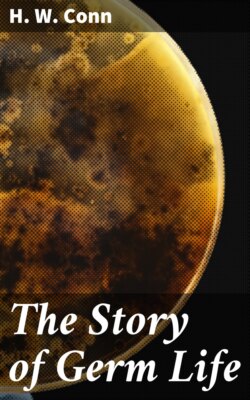Читать книгу The Story of Germ Life - H. W. Conn - Страница 23
На сайте Литреса книга снята с продажи.
WHERE BACTERIA ARE FOUND.
ОглавлениеThere are no other plants or animals so universally found in Nature as the bacteria. It is this universal presence, together with their great powers of multiplication, which renders them of so much importance in Nature. They exist almost everywhere on the surface of the earth. They are in the soil, especially at its surface. They do not extend to very great depths of soil, however, few existing below four feet of soil. At the surface they are very abundant, especially if the soil is moist and full of organic material. The number may range from a few hundred to one hundred millions per gramme. [Footnote: One gramme is fifteen grains.] The soil bacteria vary also in species, some two-score different species having been described as common in soil. They are in all bodies of water, both at the surface and below it. They are found at considerable depths in the ocean. All bodies of fresh water contain them, and all sediments in such bodies of water are filled with bacteria. They are in streams of running water in even greater quantity than in standing water. This is simply because running streams are being constantly supplied with water which has been washing the surface of the country and thus carrying off all surface accumulations. Lakes or reservoirs, however, by standing quiet allow the bacteria to settle to the bottom, and the water thus gets somewhat purified. They are in the air, especially in regions of habitation. Their numbers are greatest near the surface of the ground, and decrease in the upper strata of air. Anything which tends to raise dust increases the number of bacteria in the air greatly, and the dust and emanations from the clothes of people crowded in a close room fill the air with bacteria in very great numbers. They are found in excessive abundance in every bit of decaying matter wherever it may be. Manure heaps, dead bodies of animals, decaying trees, filth and slime and muck everywhere are filled with them, for it is in such places that they find their best nourishment. The bodies of animals contain them in the mouth, stomach, and intestine in great numbers, and this is, of course, equally true of man. On the surface of the body they cling in great quantity; attached to the clothes, under the finger nails, among the hairs, in every possible crevice or hiding place in the skin, and in all secretions. They do not, however, occur in the tissues of a healthy individual, either in the blood, muscle, gland, or any other organ. Secretions, such as milk, urine, etc., always contain them, however, since the bacteria do exist in the ducts of the glands which conduct the secretions to the exterior, and thus, while the bacteria are never in the healthy gland itself, they always succeed in contaminating the secretion as it passes to the exterior. Not only higher animals, but the lower animals also have their bodies more or less covered with bacteria. Flies have them on their feet, bees among their hairs, etc.
In short, wherever on the face of Nature there is a lodging place for dust there will be found bacteria. In most of these localities they are dormant, or at least growing only a little. The bacteria clinging to the dry hair can grow but little, if at all, and those in pure water multiply very little. When dried as dust they are entirely dormant. But each individual bacterium or spore has the potential power of multiplication already noticed, and as soon as it by accident falls upon a place where there is food and moisture it will begin to multiply. Everywhere in Nature, then, exists this group of organisms with its almost inconceivable power of multiplication, but a power held in check by lack of food. Furnish them with food and their potential powers become actual. Such food is provided by the dead bodies of animals or plants, or by animal secretions, or from various other sources. The bacteria which are fortunate enough to get furnished with such food material continue to feed upon it until the food supply is exhausted or their growth is checked in some other way. They may be regarded, therefore, as a constant and universal power usually held in check. With their universal presence and their powers of producing chemical changes in food material, they are ever ready to produce changes in the face of Nature, and to these changes we will now turn.
